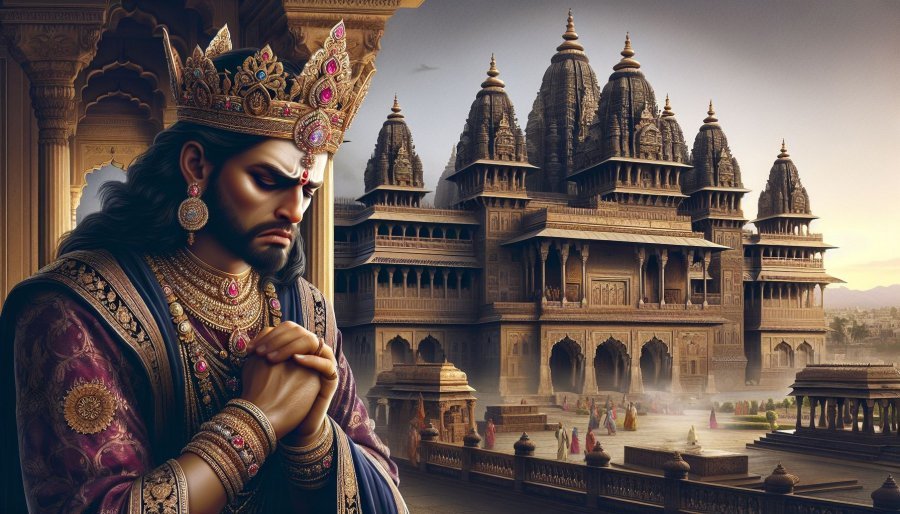Section XLVIII [summary]
Book index: Mahabharata (English)
This page contains a summary of the Mahabharata Section XLVIII including examples of moral lessons in daily life. The Maha-Bharata is one of the largest epics ever written containing roughly 100,000 Sanskrit verses. It deals with the legendary history of ancient India and contains a large number of interwoven tales.

Short summary of the chapter:
King Dhritarashtra, upon hearing of Arjuna's incredible feats at Indra's abode, expressed great concern about his own son's actions and the impending battle with the Pandavas. He acknowledged the unmatched prowess of Arjuna and feared for the fate of his sons against such a formidable warrior. Dhritarashtra saw no way to achieve victory over Arjuna, as he believed none of his allies could match his skill and power. He lamented the inevitable calamity that would befall the earth if the battle ensued, recognizing Arjuna as a force to be reckoned with. In his despair, he questioned how his own wrath, which had provoked Arjuna, could ever be pacified, knowing the destructive force the warrior possessed.
Full English translation:
This page is merely a summary which is automatically generated. If you are looking for authentic sources such as the Sanskrit text or the Full English translation of Mahabharata Section XLVIII, have a look at the following articles:
Section XLVIII, online text
English translation by Kisari Mohan Ganguli.
Read this and other chapters online.
Mahabharata (English Summary)
by Kisari Mohan Ganguli | ISBN-10: 8121505933
Buy the latest edition:
FAQ of Section XLVIII:
What did Dhritarashtra say about Arjuna's feats and abilities?
Dhritarashtra praised Arjuna's skills and feared for his sons' defeat in battle.
How did Dhritarashtra feel about Arjuna's invincibility in battle?
Dhritarashtra believed Arjuna's strength could only be matched by death itself.
Why did Dhritarashtra think peace would only come through Arjuna's death?
Dhritarashtra saw Arjuna as a powerful force that could only be pacified through death.
Mahabharata Section XLVIII in daily life:
Dhritarashtra's reflection upon hearing of Arjuna's feats and powers offers a poignant lesson about recognizing and respecting the capabilities of others, even those we may perceive as adversaries. In daily life, this story encourages us to acknowledge the strengths and potential of those around us, rather than underestimating them due to personal biases or conflicts. Just as Dhritarashtra contemplates the invincibility of Arjuna and the futility of confronting him with ill-prepared warriors, we too should consider the consequences of our actions and the importance of understanding the skills and contributions of others.
The king's realization about the destructive path his sons are on, by choosing conflict over peace, serves as a reminder to assess our own choices and their impact on our surroundings. The story teaches that fostering rivalry and harboring negative intentions can lead to adverse outcomes, not just for opponents, but for ourselves as well. It underscores the importance of seeking harmony and recognizing that true strength lies in wisdom and the ability to see beyond immediate gains, towards a more inclusive and peaceful coexistence.
In essence, the narrative encourages self-reflection, urging us to contemplate our motivations and actions, and to appreciate the qualities and perspectives of others. By doing so, we can foster a more understanding and collaborative environment, whether in personal relationships, professional settings, or broader societal interactions.
